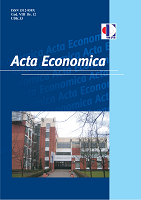РЕАКЦИЈА РАЗЛИЧИТИХ КАПИТАЛИСТИЧКИХ СИСТЕМА НА ПОЈАВУ ЕКОНОМСКЕ КРИЗЕ
HOW ARE DIFFERENT CAPITALIST SYSTEMS COPING WITH THE CURRENT ECONOMIC CRISIS?
Author(s): Janez Prašnikar, Darja LeskovecSubject(s): National Economy, Supranational / Global Economy, Economic history, Economic policy, Economic development, Socio-Economic Research
Published by: Економски факултет Универзитета у Бањој Луци
Keywords: Global economic crisis; capitalist systems; world trade; export; postponeable goods; market economex-Yugoslav countries; intangibles; tradables vs. nontradables; Slovenia;
Summary/Abstract: With the fall of socialist economies, the distinct line between capitalist and socialist economic systems disappeared. Hence contemporary authors speak of "new comparative economics" that studies alternative models of capitalism, represented by different institutions. In this paper we study and analyze different models of capitalism (Anglo-Saxon Liberal, Nordic, Continental European, Mediterranean, Japanese and Korean, Baltic Transitional, Ex-Yugoslav Transitional, Ex-Soviet Transitional, and Chinese and Indian model) from the perspective of their economic efficiency before the crisis, measures taken to tackle the crisis and their prospects for the future. However, when discussing the prospects for the future, the common factor hindering the growth of all capitalist economies is a slow recovery of global trade and GDP after the great collapse in 2009. Simultaneous demand shock and decline of the production and trade in the "postponeable" goods sector warn against too high dependence of economies on a single trade partner and suggest dispersion of foreign trade. Moreover, with higher intangible investments and higher efficiency of nontradable sector, the efficiency of tradable sector would increase, too. In this paper we illustrate this idea with the case of Slovenian exporters.
Journal: Acta Economica
- Issue Year: 8/2010
- Issue No: 12
- Page Range: 9-42
- Page Count: 34
- Language: Serbian

